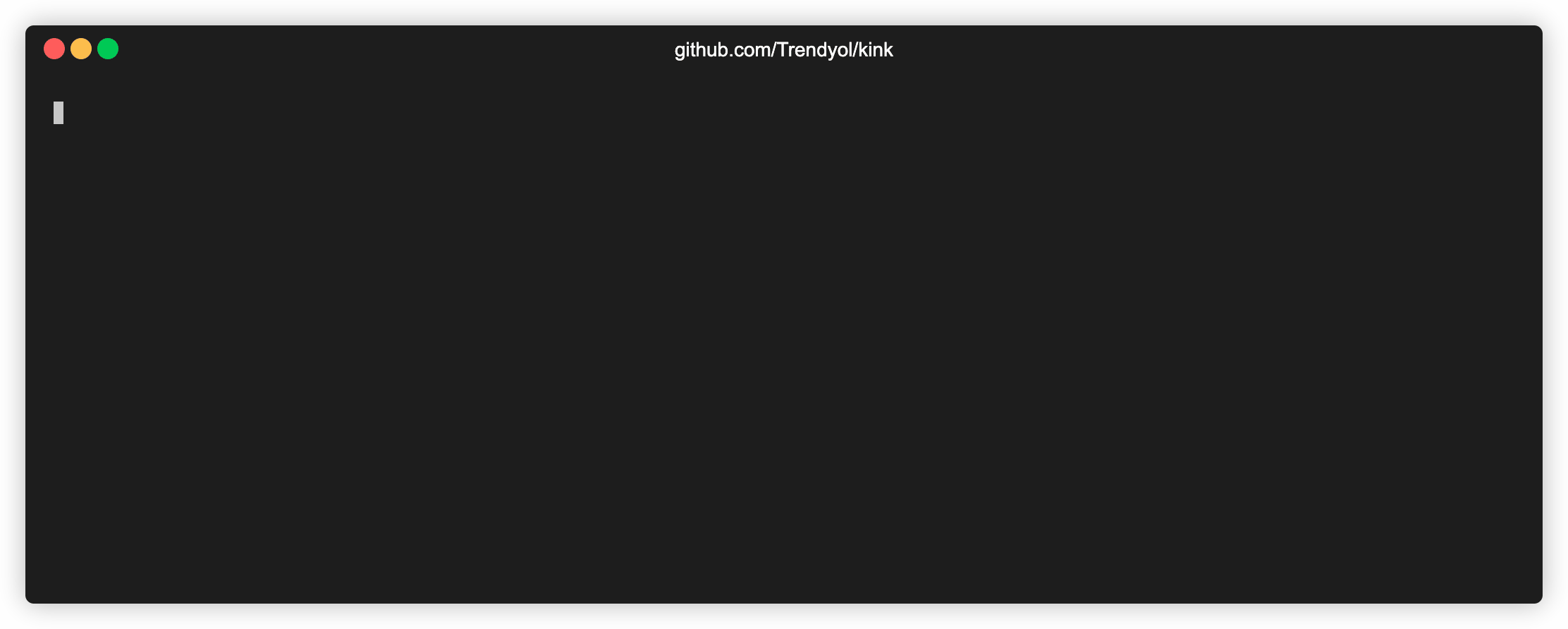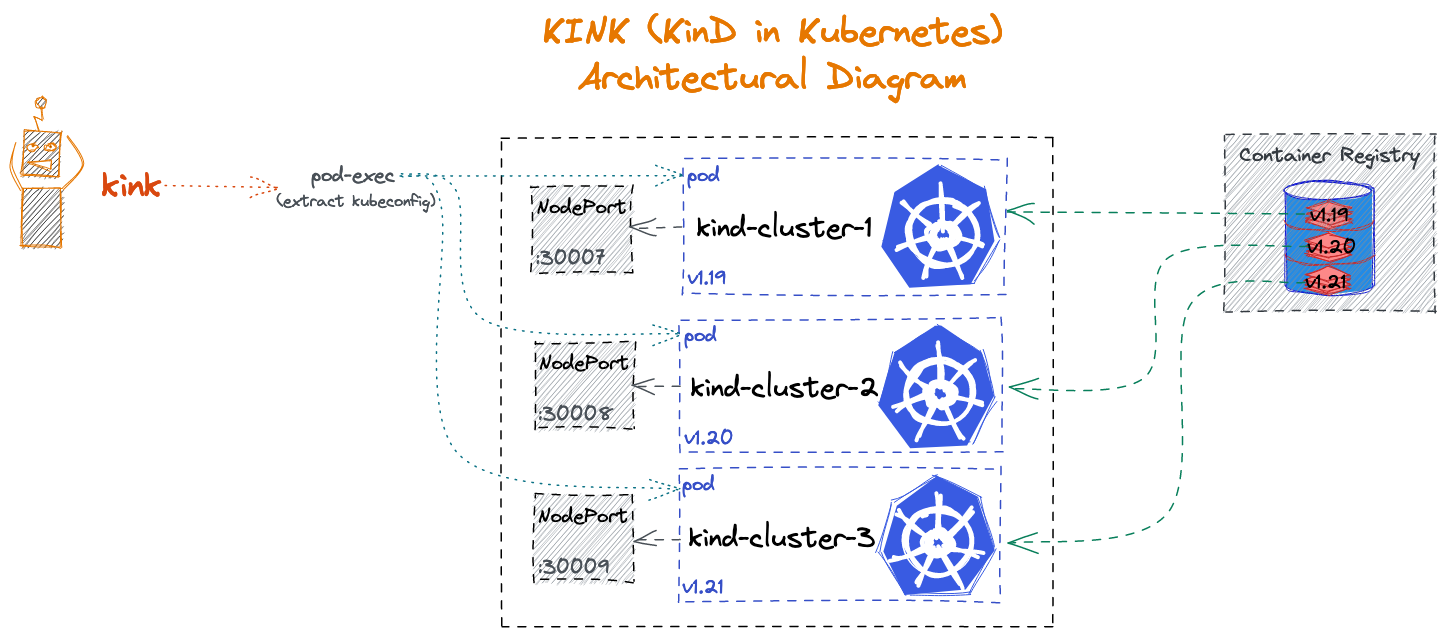A helper CLI that facilitates to manage KinD clusters as Kubernetes pods.
Before getting started into the kink, we should talk about a bit KinD first who is not familiar with this project. KinD is a tool for running local Kubernetes clusters using Docker container _ nodes_. KinD was primarily designed for testing Kubernetes itself, but may be used for local development or CI.
So, what is kink then, where does this idea come from?
kink is a CLI application that facilitates to run KinD cluster in Kubernetes Pod and also manages the whole lifecycle of these clusters such as by listing them, deleting them, etc. There is a very detailed guide about how you can run KinD cluster in a Pod, for more detail, please see because this is where the idea came from.
The idea is that when you want to run ephemeral clusters by using projects like KinD in your CI/CD system instead of having Kubernetes clusters, because it might cost more, you might want to run your KinD cluster in a Pod, especially if you are using Gitlab as a CI/CD solution and running your jobs as Kubernetes Pod. This project specifically aims to solve that problem. By using kink, you can easily manage whole lifecycle of your KinD cluster no matter how many they are as Kubernetes Pod.
kink is a just a wrapper around managing Docker images which are purposely built to run KinD on Kubernetes clusters inside a Pod. As I mentioned above, there is very detailed guide that explains all the necessary details to run Kind on Kubernetes clusters inside Pod. So, there are some Docker images which we maintained it here. In this repository, we are providing Docker images for different version of Docker and Kubernetes . Then, kink allows you to create Kubernetes Pods based on Docker images we provide and connect to the cluster running inside a Pod. In order the connect to the cluster running inside a Pod, kink does some tricks such as creating Kubernetes Service and adding node IP which is scheduled on to the CERT_SANS addresses to make the connection secure over HTTPS.
kink uses labels to follow the user activities because we have to provide multi-tenancy support for our users in order to avoid stepping each other toes in same Kubernetes environment, you can see the label which we are currently using to achieve uniqueness. https://github.com/Trendyol/kink/-/blob/master/cmd/run.go#L91
If you have Go 1.16+, you can directly install by running:
$ go install github.com/Trendyol/kink@latestand the resulting binary will be placed at $HOME/go/bin/kink.
If you have brew installed, then you can easily download this with the following commands:
brew tap trendyol/trendyol-tap
brew install kink$ kink --help
A helper CLI that facilitates to manage KinD clusters as Kubernetes pods
Usage:
kink [command]
Available Commands:
completion Generate completion script
delete Ephemeral cluster could be deleted by delete command
help Help about any command
list List all ephemeral cluster
list-supported-versions List all supported k8s versions
run Ephemeral cluster could be created by run commandThis shows how to:
- list supported Kubernetes versions
- pick one of these versions and run KinD cluster
- list KinD clusters
- delete KinD clusters
$ kink list-supported-versions
v1.16.15
v1.17.17
v1.19.11
v1.20.7
v1.21.2- Choose one of your favorite Kubernetes distribution such as KinD, Minikube, k0s, k3s, etc and run it first.
Create custer with kind
$ kind create clusterRun kink
$ kink run hello-world --timeout 360
[1/1] Creating Pod hello-world... 100% [===============] (0.001 kB/s)KUBECONFIG file has been written to
the directory: /var/folders/pf/6h9t0mnd4d342ncgpjq_3zl80000gp/T/kink_kubeconfig3638074110/kubeconfig
Thanks for using kink!
Pod hello-world and Service hello-world created successfully!
You can view the logs by running the following command:
$ kubectl logs -f hello-world -n default
KUBECONFIG file generated at path '/Users/batuhan.apaydin/workspace/projects/trendyol/k8s-common/kubeconfig'.
Start managing your internal KinD cluster by running the following command:
$ KUBECONFIG=/Users/batuhan.apaydin/workspace/projects/trendyol/k8s-common/kubeconfig kubectl get nodes -o wide- You can list all the KinD cluster provisied by yourself:
$ kink list
NAMESPACE NAME AGE LABELS
default pod/hello-world 5m5s generated-uuid=99596236-4b08-4e09-82ec-db3158840a1c,runned-by=batuhan.apaydin_C02DM1U3MD6R- You can delete all the KinD clusters that you provisioned:
$ kink delete --all --force
Deleting Pod hello-world
Deleting Service hello-world
- or you can delete one of them by speficying its name in the -name flag.
To load completions:
$ source <(kink completion bash)
# To load completions for each session, execute once:
# Linux:
$ kink completion bash > /etc/bash_completion.d/kink
# macOS:
$ kink completion bash > /usr/local/etc/bash_completion.d/kink# If shell completion is not already enabled in your environment,
# you will need to enable it. You can execute the following once:
$ echo "autoload -U compinit; compinit" >> ~/.zshrc
# To load completions for each session, execute once:
$ kink completion zsh > "${fpath[1]}/_kink"
# You will need to start a new shell for this setup to take effect.$ kink completion fish | source
# To load completions for each session, execute once:
$ kink completion fish > ~/.config/fish/completions/kink.fishPS> kink completion powershell | Out-String | Invoke-Expression
# To load completions for every new session, run:
PS> kink completion powershell > kink.ps1
# and source this file from your PowerShell profile.





